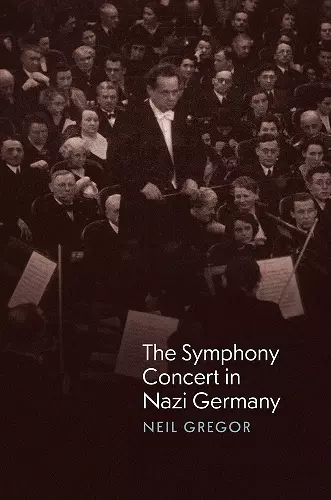The Symphony Concert in Nazi Germany
Format:Hardback
Publisher:The University of Chicago Press
Publishing:30th May '25
£30.00
This title is due to be published on 30th May, and will be despatched as soon as possible.

A new history of how the musical worlds of German towns and cities were transformed during the Nazi era.
In the years after the Nazis came to power in January 1933 and through the war years all aspects of life in Germany changed. However, despite the social and political upheaval, gentile citizens were able to continue leisure activities such as attending concerts. In this book, historian Neil Gregor surveys the classical concert scene in Nazi Germany from the perspective of the audience, rather than institutions or performers. Gregor delves into the cultural lives of ordinary Germans under conditions of dictatorship. Did the ways in which Germans heard music in the period change? Did a Nazi way of listening emerge?
For audiences, Gregor shows, changes to the concert experience were small and often took place around the edges. This, combined with the preserved idea of the concert hall as a space of imagined civility and cultivation, led many concertgoers and music lovers to claim after the war that their field and their practice had been innocent-a place to retreat from the vicious violence and racism of the Nazi regime. Drawing on untapped archival sources, The Symphony Concert in Nazi Germany reveals that the true history was one of disruption but also of near effortless adaptation. Through countless small acts, the symphony concert was reframed within the languages of strident nationalism, racism, and militarism to ensure its place inside the cultural cosmos of National Socialist Germany.
“A woman leans over to talk to her friend in the seat behind her. Orchestra musicians chat before the concert. A double bassist is called up for the draft, bringing a regional orchestra to a crisis. Concert times are changed because of air-raid alarms. Gregor’s sharp eye and ear for such details opens a world of sights and sounds from the lived experience of audiences, musicians, and administrators during the Third Reich. Gregor offers a social and sensory history that draws from his unparalleled knowledge of the political, social, and cultural landscape of the Third Reich. This immensely erudite but highly readable study gives us a multisensory awareness of the contradictions and paradoxes of this brutal regime that revered culture.” * Anne Shreffler, Harvard University *
“This is a provocative, disturbing, and original book. Using unexplored sources—photographs, architecture, acoustics, newspaper coverage, local civic archives, governmental records, and private diaries—Gregor strips the veil of innocence from concert life and listening. He shows how the Nazis exploited an entrenched conceit that predated 1933: the belief that classical music exemplified German superiority and Germany’s special sense of community. This book challenges the notion that Germany’s public musical culture under Nazism was a protected space of individual subjectivity and aesthetic distance separate from the radical evil and inhumanity of Nazism.” * Leon Botstein, music director of the American Symphony Orchestra and president of Bard College *
“How did the concertgoing public and classical musicians align their aesthetic tastes with Nazism? All too easily, as Gregor shows us in this tour de force of a book. With immense knowledge and consummate finesse, he guides us into the world in which ‘art music’ was performed. This was Nazism in its upper-middle-class, educated register, virtually indistinguishable from the broader current of conservative nationalism. The classical concert, as Gregor shows brilliantly, was no safe refuge from the demands of the dictatorship. It was Nazi Germany.” * Nicholas Stargardt, author of "The German War: A Nation under Arms, 1939–45" *
“Gregor’s book is an astonishing work of cultural history that strikes right at the heart of meaning-making, listening, and identity in twentieth-century Germany. In incisive, bold, and beautiful prose, Gregor guides us through how audiences, performers, and critics supported and maintained nationalist and racist ideologies in surprising ways. I am in awe of this deeply researched, gorgeously conceived, and profoundly thoughtful work of scholarship. May we sit with Gregor’s words for a very long time.” * Kira Thurman, author of "Singing like Germans: Black Musicians in the Land of Bach, Beethoven, and Brahms" *
“This is a magnificent work, taking a novel and long-overdue approach to demystifying the concert experience by investigating its behind-the-scenes workings. Gregor not only breaks down misconceptions about the Nazis’ micromanagement of cultural affairs but also draws on rich and varied resources that can deepen our understanding of the relationships between orchestras and their audiences then and now.” * Pamela M. Potter, University of Wisconsin, Madison *
ISBN: 9780226839103
Dimensions: unknown
Weight: 454g
384 pages